Will Self - Walking to Hollywood
Здесь есть возможность читать онлайн «Will Self - Walking to Hollywood» весь текст электронной книги совершенно бесплатно (целиком полную версию без сокращений). В некоторых случаях можно слушать аудио, скачать через торрент в формате fb2 и присутствует краткое содержание. Год выпуска: 2011, Издательство: Grove/Atlantic, Inc., Жанр: Современная проза, на английском языке. Описание произведения, (предисловие) а так же отзывы посетителей доступны на портале библиотеки ЛибКат.
- Название:Walking to Hollywood
- Автор:
- Издательство:Grove/Atlantic, Inc.
- Жанр:
- Год:2011
- ISBN:нет данных
- Рейтинг книги:4 / 5. Голосов: 1
-
Избранное:Добавить в избранное
- Отзывы:
-
Ваша оценка:
- 80
- 1
- 2
- 3
- 4
- 5
Walking to Hollywood: краткое содержание, описание и аннотация
Предлагаем к чтению аннотацию, описание, краткое содержание или предисловие (зависит от того, что написал сам автор книги «Walking to Hollywood»). Если вы не нашли необходимую информацию о книге — напишите в комментариях, мы постараемся отыскать её.
Walking to Hollywood — читать онлайн бесплатно полную книгу (весь текст) целиком
Ниже представлен текст книги, разбитый по страницам. Система сохранения места последней прочитанной страницы, позволяет с удобством читать онлайн бесплатно книгу «Walking to Hollywood», без необходимости каждый раз заново искать на чём Вы остановились. Поставьте закладку, и сможете в любой момент перейти на страницу, на которой закончили чтение.
Интервал:
Закладка:
‘No,’ the bald one in the white T-shirt answered. ‘Yer awl ahtuv it now, lad. But if ewe go oop the cliff, like, u can walk along there.’
I thanked him and went on — but he was wrong: the cliff top had run for only fifty yards beneath my feet when it revealed itself to be nought but a headland, so I was exiled back down to what was no longer a beach at all, only a broad ledge of mud, with teeth cut out of it by longshore drift. Infective fluid surged into these inlets, swirling around the carcasses of rusted engines and jaundiced white goods.
Sand dunes sighed in from the west, their flanks creeping with marram grass, their hummocks and vales networked with paths of wooden slats wired apart. A sign directed me away from a PROTECTED SITE where terns were nesting. Their small white bodies blasted their black heads into grey space; then they fell to earth and resumed their positions, fluffuzzling up beside thistles and Flora margarine tubs. Could this go on indefinitely? Ignorant as I was, I doubted it — besides, who was the second who walked alongside me, skipping through the misty drapes, taunting the periphery of my vision? When I did the head-count there was only the one — still, there he was, sometimes dragging behind, other times scampering ahead along the muddy ledge. I didn’t trust him.
I came upon an entire forty-foot-long blockhouse that had been abandoned on the beach by the retreating land. Beyond this a phantasmagorical confusion of military concrete — beige discs, rectangles, triangles and trapezoids — was aping a promontory. What was all this — the shattered remains an accident-prone temple?
Clambering about on the heap were a couple of kids, a yapping terrier and a bored dad. I joined them on a ramp that tended at a 20-degree angle to the German Ocean.
‘D’you know where the sound mirror is?’ I asked without preamble or forethought.
‘You don’t want to go bothering with that,’ the dad said, his tone so sharp that at first I thought he was warning off the terrier, which was gnawing at a stalk of seaweed. But no: he meant me.
‘Oh, why’s that, then?’
‘It’s nowt but a stupid lump of concrete — and there’s enough of ’em here.’
‘I thought it was an early-warning device — for zeppelin raids during the First War. They say if you put your ear up against it you can hear…’ I trailed off, because all of this had come to me unbidden, and I had no idea what could be heard in a sound mirror.
‘Aye, that’s right,’ the dad said snidely. ‘What would you hear — fook awl, there’s fook awl to hear, here, nowt except those fookin turbines out there.’ He jerked a thumb at the crescent of sea.
‘Turbines?’ I queried, but one of the kids had come up to show him something she’d found and he dismissed me with some cursory directions.
To make my way through the caravan park, then along the lane that skirted the bird reserve. There I found a noticeboard that had trapped a heterogeneous flock of seafowl behind its glass, and next to it a handmade way marker that pointed towards THE SOUND MIRROR, and added hopefully, CREAM TEAS.

Out in the wheat field the sound mirror bloomed. Softened by the sea fret it was movingly lovely. The circular depression in its seaward side suggested that somewhere nearby hovered the enormous and comforting breast that had moulded it. I laid my cheek where it once had been and suckled on the sounds: the gull squeak and peewit, the distant groan of heavy machinery, the cries of children, the groans of the dispossessed, and the entreaties of those about to die. Were these the warnings of the deadly paravane, at that very moment being towed through the choppy skies towards me, passing over the silt that was once Northorpe and Hoton? I didn’t know, and besides, even — even! — if I were able to recognize these harbingers I still would not have heeded them, for in the four minutes it took for the zeppelin to arrive, I would’ve forgotten all about it.
5. The Struldbrug
‘D’you mind my asking, but what’re you fishing for?’
‘Dunno, it’s my first time here.’
Here being the tidal flats of the Isle of the Dead, exposed now that filmic civilization is ebbing away, and washed up upon them this marriage on the half shell — a blue nylon one, six feet across, ribbed with fibreglass poles. When I strolled past its lip, there they were — the meaty beings secondarily reliant on the suck of the current, siphoning it in through a taut nylon line and a long bent rod. They were in their fifties, she seated on a folding chair with truncated legs; he on the sand, his ankles boyishly crossed, a cigarette cupped in the half shell of his hand.
‘I thought your gear looked new—’
‘No, not my first time ever — I fish up and down the coast the whole time.’
Sturdy pride to buoy him up, the shell upended, a coracle now in which they paddle up and down the Holderness.
‘And what do you catch?’
‘This time of t’year, bass.’
Big-mouthed Billy-man, nailed to a plaque. Spasming at the waist, I walked away, my head hammering at the point of my shoulder, then, luminously ascended to a knoll from where I saw the reddest Nissan saloon parked in a sandy car park, beyond it a footprinted shore disappearing into the mist, and over to the right a line of telegraph poles and gorse bushes, the dorsal crest of a peninsula:
Spurn Head.
This much I did know: I had arrived at this wavering landmass, flipped this way and that by the sea for millennia, the tail of the East Riding lashing at Old Kilnsea, Ravenser and Ravenser Odd, so scattering their people on the face of the deep. Ravenser, or Ravensburg, or Ravenseret — it was once one of the wealthiest ports in the kingdom. It returned two members to parliament, held two markets a week and mounted an annual fair that lasted for over a month. ‘Away with me in post to Ravenspurgh!’ cries Northumberland in the opening scene of Act Two of Richard the Second ; however, it’s Ravenspurgh that’s been had away, dissolved so completely that by the 1580s there was nothing left, and Shakespeare was name-checking an Atlantis. The last reference to the town was in Leland’s sixteenth-century Itinerary , and presumably by then, Richard Reedbarowe, the hermit of the chapel of Ravenserporne, was long gone.
As early as the 1350s, the chronicler of Meaux wrote, ‘When the inundations of the sea and of the Humber had destroyed the foundations of the chapel of Ravenserre Odd, built in honour of the Blessed Virgin Mary, so that the corpses and bones of the dead there buried horribly appeared, and the same inundations daily threatened the destruction of the said town, sacrilegious persons carried off and alienated certain ornaments of the said chapel, without our due consent, and disposed of them for their own pleasure—’
The rubber figurine, with the head of a pig, dressed in a blue Churchillian siren suit; the detachable penises and arms, carved from pinewood, of late Bronze Age votary objects; the neurofibrillary tangle and the amyloid visible as applegreen yellow birefringence; the UPVC windows and the water colours salvaged from the slidden studio at Skipsea; the madman holding a handful of individual UHT milk pots to his face — all mine, he mutters, all mine.
What brings you up here, to an area of land almost equal to that upon which London stands, but which has now been swept away?
Oh, pleasure, pleasure! What else should bring one anywhere? Eating as usual, I see, Algy?
Eaten up by introspection, I frogmarched myself on along the spit; the last few incisive nibbles would soon have done with the amyloid, the core of the present would be consumed, and the simple past would be all that there is, or ever can be. A line of wooden piles stood — stand — in the surf, spiny with iron spikes upon which seaweed and shreds of fishing nets have caught. What was — is — this, some futile attempt to fix the shifting mass to the bedrock? Or were — are — they, the staves of musical notation, a very late Romanticism of surging chords, gut-wrenching melodies and lofty crescendos, the entire gleaming metropolis of sounds long since sunk, church bells withal, beneath the shallow German Ocean?
Читать дальшеИнтервал:
Закладка:
Похожие книги на «Walking to Hollywood»
Представляем Вашему вниманию похожие книги на «Walking to Hollywood» списком для выбора. Мы отобрали схожую по названию и смыслу литературу в надежде предоставить читателям больше вариантов отыскать новые, интересные, ещё непрочитанные произведения.
Обсуждение, отзывы о книге «Walking to Hollywood» и просто собственные мнения читателей. Оставьте ваши комментарии, напишите, что Вы думаете о произведении, его смысле или главных героях. Укажите что конкретно понравилось, а что нет, и почему Вы так считаете.












